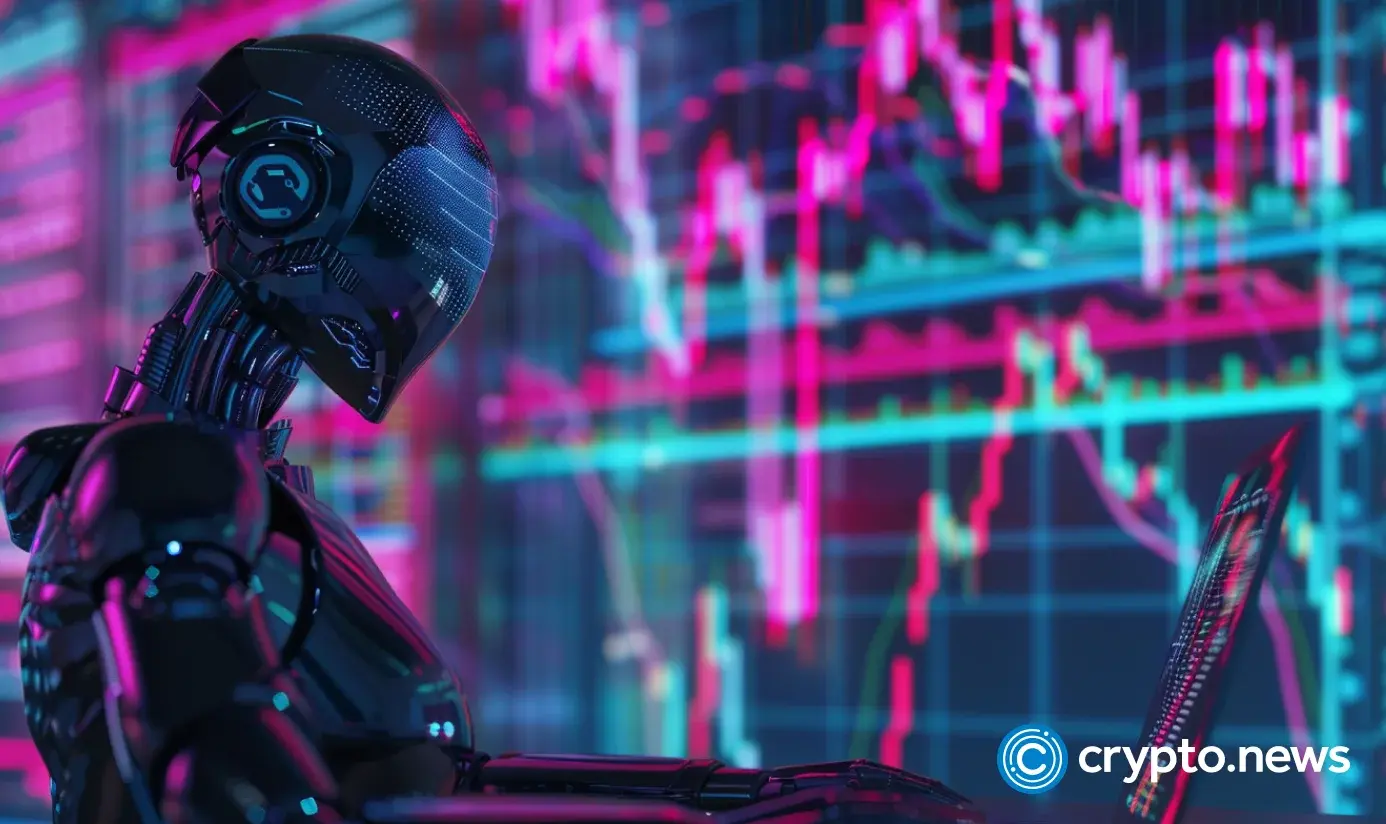Easier trading: AI bots level the playing field for average investors | Opinion
07/26/2024 20:10
Integrating web3 technologies, such as defi and smart contracts, further amplifies trading AI bots potential, fostering greater transparency and security in trading activities.
Disclosure: The views and opinions expressed here belong solely to the author and do not represent the views and opinions of crypto.news’ editorial.
Trading in financial markets has long been the domain of professional traders and institutions, leaving average investors at a significant disadvantage. According to a report by Charles Schwab, over 70% of trades in the US stock market are executed by institutional investors, highlighting the considerable edge they possess over retail traders. The complex nature of market dynamics, the need for constant vigilance, and the sheer volume of data to be analyzed create barriers that many find insurmountable. However, AI trading bots are changing this narrative, enabling everyday investors to navigate the financial markets more easily and efficiently.
Overcoming traditional barriers with AI trading bots
For decades, successful trading has required a deep understanding of market trends, access to real-time data, and the ability to make quick decisions based on complex analyses. This environment has traditionally favored institutional investors and professional traders who possess the resources and expertise necessary to thrive. On the other hand, average investors often struggle to keep up, lacking the time, tools, and knowledge to compete effectively.
AI trading bots are bridging this gap by automating trades and analyzing vast amounts of market data in real time. These bots use machine learning algorithms to predict market movements and execute trades at optimal times, often outperforming human traders in both speed and accuracy.
Advantages of AI trading bots
Lowering the entry barriers: AI trading bots simplify complex trading strategies, enabling inexperienced users to participate in the market. By automating the trading process, these bots allow average investors to benefit from sophisticated techniques previously accessible only to professionals.
Boosting efficiency and risk management: AI bots can process and analyze large datasets swiftly, executing trades at the most opportune moments. According to Allied Market Research, AI in the financial market is projected to reach $368.6 billion by 2032, underscoring the growing reliance on AI-driven tools. Additionally, AI bots excel in managing risks by using predictive analytics to forecast price movements and adjust strategies accordingly, offering a level of stability that manual trading often cannot achieve.
The power of web3 integration
AI trading bots have significantly enhanced the trading experiences of many average investors. According to a study highlighted by CoinDesk, retail investors using AI-driven trading platforms have seen substantial improvements in their trading performance. These tools enable users to make more informed decisions and achieve better outcomes compared to traditional trading methods.
Defi integration for enhanced transparency. The advent of web3 technologies, particularly decentralized finance, has further amplified the capabilities of AI trading bots. Defi platforms utilize blockchain technology to facilitate more transparent and secure transactions. When AI trading bots are integrated with defi protocols, they can execute trades across multiple decentralized exchanges, optimizing for the best prices and liquidity pools. This integration increases trading efficiency and ensures a higher degree of security and transparency. For example, platforms like Uniswap have experienced a surge in automated trading activity, which has improved market depth and reduced slippage, making it easier for all traders to execute transactions at favorable prices.
Tokenization and smart contracts. Web3 also introduces the concepts of tokenization and smart contracts, which are integral to the functionality of AI trading bots in the decentralized ecosystem. Tokenization allows assets to be represented digitally on the blockchain, providing greater liquidity and accessibility. Smart contracts enable automated and self-executing agreements based on predefined conditions. AI trading bots can leverage these smart contracts to automate complex trading strategies without the need for intermediaries, ensuring seamless and efficient trading operations. Additionally, web3 is completely different from traditional finance, so the input data should be specifically adjusted to reflect its unique characteristics.
Addressing potential challenges
While AI trading bots offer numerous benefits, there are potential downsides to consider. One concern is the over-reliance on technology. Investors must remain vigilant and ensure that they understand the underlying mechanics of the bots they use. Regular monitoring and updates are essential to maintain optimal performance and avoid potential pitfalls.
As AI trading bots become more prevalent, regulatory bodies are taking a closer look at their use in the financial markets. Ensuring that these tools operate within legal frameworks is crucial to prevent issues related to market manipulation and unfair practices. Investors and developers alike must stay informed about regulatory developments to navigate this evolving landscape effectively.
Embracing the future
AI trading bots are fundamentally transforming the financial landscape for average investors. By lowering entry barriers, enhancing trading efficiency, and improving risk management, these advanced tools are democratizing access to financial markets. Integrating web3 technologies, such as defi and smart contracts, further amplifies their potential, fostering greater transparency and security in trading activities.
As these technologies continue to evolve, they promise to make sophisticated trading strategies accessible to all, not just seasoned traders. Investors are encouraged to explore the capabilities of AI trading bots to enhance their trading strategies and realize better outcomes, contributing to a more inclusive and equitable financial ecosystem.

Jonas Dovydaitis is the CEO and co-founder of PAiT, a decentralized exchange on Solana. Founded in 2024, PAiT combines order book and AMM models for efficient trading, offering advanced trading tools, AI-driven insights, copy trading, and community-centric tokenomics. $PAiT token holders benefit from profit-sharing, AI insights, and governance rights. Equipped with a background in mechanical engineering, international construction, and real estate, Jonas earned his Bachelor’s degree in Mechanical Engineering and, at 22, launched a successful construction company in Sweden, Majoni, managing over 100 employees and generating €10 million in revenues. In 2020, Jonas transitioned into forex trading and cryptocurrency, leveraging his extensive business experience to create PAiT and drive innovation in the crypto market.